

BBC Learning English - Course: intermediate / Unit 14 / Session 1 / Activity 1. BBC Learning English - Course: intermediate / Unit 16 / Session 1 / Activity 1. BBC Learning English - Course: intermediate / Unit 7 / Session 1 / Activity 1. BBC Learning English - Course: lower intermediate / Unit 1 / Session 1 / Activity 3. VOCABULARY: Forming words with the suffixes -ness and -ity. VOCABULARY: Forming words with the suffixes -ment, -ance and -ence. VOCABULARY: Using the suffixes -tian, -sion and -tion. BBC Learning English - Course: lower intermediate / Unit 1 / Session 1 / Activity 3.
BBC Learning English - Course: lower intermediate / Unit 10 / Session 1 / Activity 3. BBC Learning English - Course: lower intermediate / Unit 10 / Session 1 / Activity 3. -able vs. -ible. Suffixes 1. About suffixes. Jaylee asks whether the plural endings -s and -es are considered suffixes.
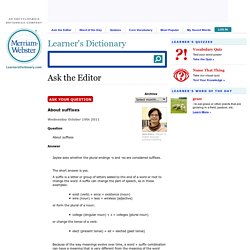
The short answer is yes. A suffix is a letter or group of letters added to the end of a word or root to change the word. A suffix can change the part of speech, as in these examples: exist (verb) + ence = existence (noun)wire (noun) + less = wireless (adjective) Suffixes - English Grammar Today - Cambridge Dictionary. A suffix is a letter or group of letters added at the end of a word which makes a new word.
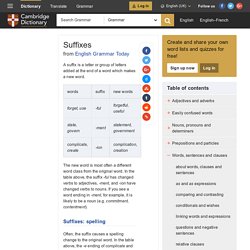
The new word is most often a different word class from the original word. In the table above, the suffix -ful has changed verbs to adjectives, -ment, and -ion have changed verbs to nouns. If you see a word ending in -ment, for example, it is likely to be a noun (e.g. commitment, contentment). Often, the suffix causes a spelling change to the original word. Suffixes 4. Suffixes 3.
BBC Learning English - Course: intermediate / Unit 7 / Session 1 / Activity 3. BBC Learning English - Course: lower intermediate / Unit 1 / Session 1 / Activity 3. Mumpreneurs and staycations – the rise of the modern suffix. The Cambridge Advanced Learner’s Dictionary defines a suffix as ‘a group of letters added at the end of a word to make a new word’.
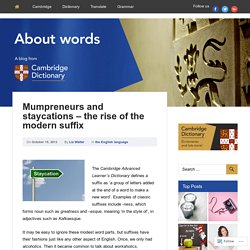
Examples of classic suffixes include -ness, which forms noun such as greatness and –esque, meaning ‘in the style of’, in adjectives such as Kafkaesque. It may be easy to ignore these modest word parts, but suffixes have their fashions just like any other aspect of English. Once, we only had alcoholics.
Effusive suffixes - Columbia Journalism Review. A marketing website offered a course called “Storytelling Through Reportage Video Production.”
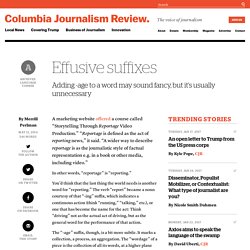
“Reportage is defined as the act of reporting news,” it said. “A wider way to describe reportage is as the journalistic style of factual representation e.g. in a book or other media, including video.” In other words, “reportage” is “reporting.” You’d think that the last thing the world needs is another word for “reporting.” The verb “report” became a noun courtesy of that “-ing” suffix, which indicates a continuous action (think “running,” “talking,” etc.), or one that has become the name for the act: Think “driving” not as the actual act of driving, but as the general word for the performance of that action.
12 Common Suffixes and What they Do - Live and Learn English. 26 Common Suffixes in English (With Examples) A suffix is a letter or a group of letters attached to the end of a word to form a new word or to change the grammatical function (or part of speech) of the word.
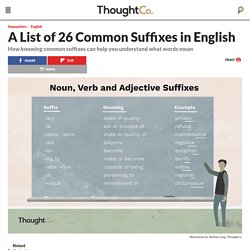
For example, the verb read is made into the noun reader by adding the suffix -er. Similarly, read is made into the adjective readable by adding the suffix -able. Understanding Suffix Meanings Understanding the meanings of the common suffixes can help you figure out the meanings of new words you encounter. In some cases, the spelling of a root or base word changes when a suffix is added. Vocabulary: plural noun endings. Rules for the use of /s/, /z/ or /IZ/ as the ending for plural nouns.
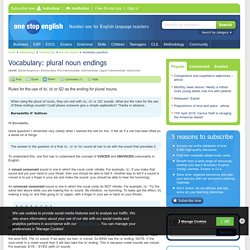
When using the plural of nouns, they can end with /s/, /z/ or /IZ/ sounds. What are the rules for the use of these endings sounds? Could please someone give a simple explanation? Thanks in advance. Bernadette O' Sullivan. BBC Learning English - Course: intermediate / Unit 7 / Session 1 / Activity 1.
Missing letters. BBC Learning English - Course: lower intermediate / Unit 20 / Session 1 / Activity 3. BBC Learning English - Course: lower intermediate / Unit 10 / Session 1 / Activity 3. BBC Learning English - Course: intermediate / Unit 7 / Session 1 / Activity 3.
-ly suffix. -let suffix. -able suffix. Job title suffixes. Eponymous adjectives. Suffixes - synonyms and related words. -able suffix used with many verbs to make adjectives describing something that can be done used with some nouns to make adjectives describing a quality that someone or something has -aholic.
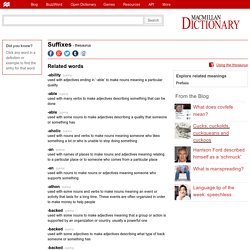
HOPE + suffixes. NATION + suffixes. Photography + suffixes. Fame+suffixes. HEALTH + suffixes. EXPENSE + suffixes. FASHION + suffix.